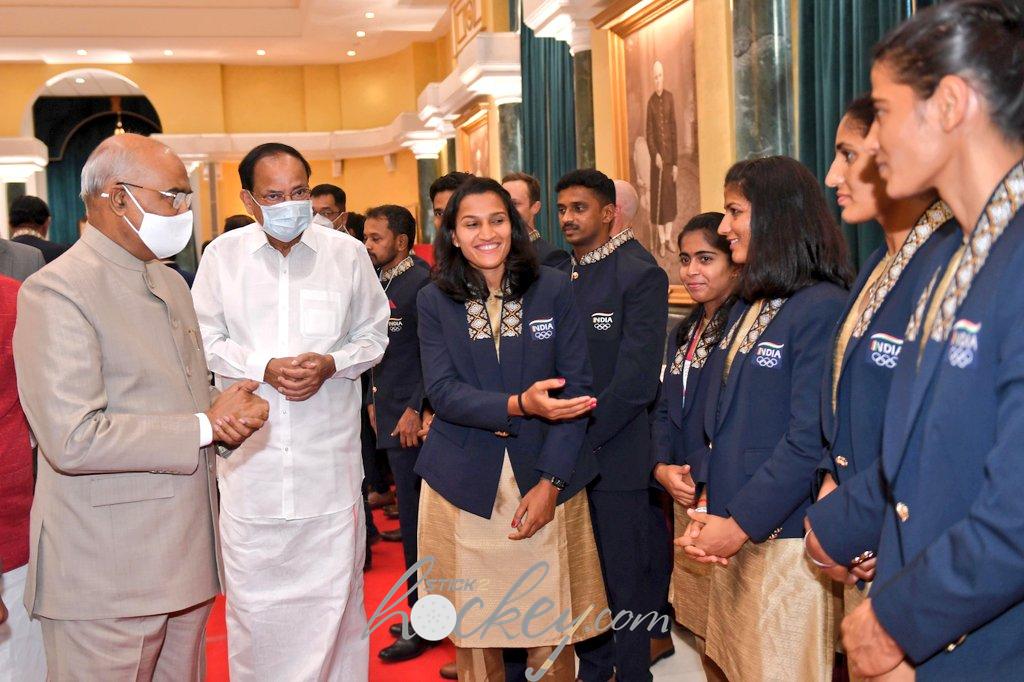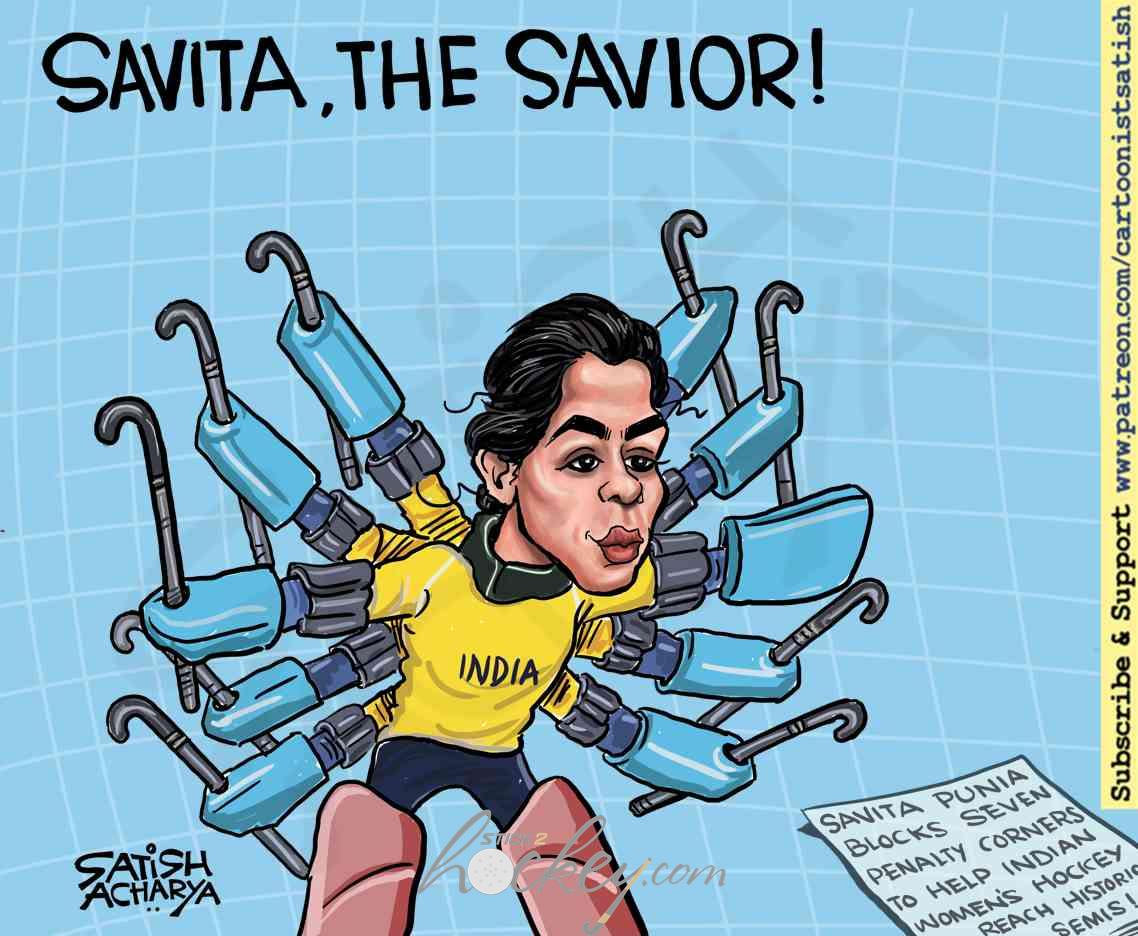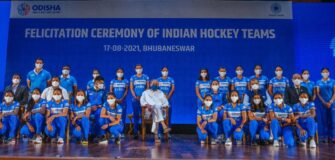HUNGER TO WIN, INDIAN EVES’ GREATEST GAIN FROM TOKYO 2020
Share
BY ERROL D’CRUZ
The pain of defeat so etched on the faces of the Indian women after the bronze medal match against Great Britain was, in a quirky way, perhaps the biggest positives from the Tokyo Olympic hockey campaign.

Tearful and agonizing over the result, a 3-4 defeat, the players appeared disconsolate but it was something that may have pleased head coach Sjoerd Marijne who said he didn’t take kindly to a contrasting attitude prevalent not so long ago.
“The girls used to be expressionless after defeat and I hated that. I simply hated that,” the Dutchman declared forthrightly. At the Oi stadium after the bronze medal slipped away, the girls were gutted, a natural consequence of expectation not realised. Of hunger to win not satiated.
If Marijne sought to transform Indian women’s hockey, the scenes could only suggest success. Finishing with the wooden spoon at Rio 2016, India came into the tournament with a daunting task. Their first three matches were against the World Cup winners The Netherlands, followed by former champions Germany and holders Great Britain.
They lost all three and hopes of a quarterfinal place were left hanging by a thread. The next match was against Ireland, a must-win. Rani Rampal’s girls took the pitch with a resolution soon to win unprecedented acclaim but a goal eluded them until the 57th minute. A back-hander from the captain herself found Navneet Kaur who slotted home from close range for the match-winner and keep her team in the race for a medal.
Then, against South Africa, India pulled off a 4-3 win, thanks to Vandana Katariya’s hat-trick – the first for an Indian woman at the Games – which eventually helped seal a quarterfinal spot after GB beat Ireland.
Rani introduces team to President of India
Target achieved. But the team looked far from satisfied and that’s where Marijne could look back on a job well done. For, when the ladies in blue took on the Hockeyroos – seven rungs adrift on the rankings – they were undaunted by the task.
What followed was a sensational 1-0 win and, what was thought ludicrous before the tournament, a place in the semi-finals. The Indian lasses came within 17 seconds and a near deflection from making taking the match into the tiebreaker but with the chance of finishing with bronze still alive, the tears hadn’t quite flowed.
It did after the GB match in which the team fought back to erase a 0-2 deficit and lead 3-2 in a five-minute blitz despite not having the greater share of exchanges. There was every reason to believe a podium spot was there for the taking. The team had made fans and critics rub eyes in disbelief. Here was an Indian women’s team matching Western outfits when it came to stamina and fitness. Even as they delighted in sub-continental skills, they played to structure and showed tactical and positional awareness absent in Indian women’s teams of the past.
Most impressive was the emergence of Gurjit Kaur, a genuine drag-flicker, rare in the women’s game, even among the high-ranking teams. Her contribution was four goals which launched her as joint top scorer for India along with Vandana. Gurjit scored all in the knockout stage after she drew a blank in the league phase where her closest attempt was from a penalty stroke which the German goalkeeper got a touch onto the upright.
Navneet Kaur, Neha Goyal, Sharmila and Rani scored one apiece in the campaign during which which ended 12-20 in terms of goals. The tireless Salima Tete created the midfield buzz. Forwards Sharmila Devi, Lalremsiami and Katariya — her blade well and truly fine tuned — carried the challenge to the opponents camp.
An integral part of the team’s splendid show must be attributed to goalkeeper Savita Punia. Against Australia, she held the citadel with breathtaking saves and timely blocks. She raised the bar for the team and herself and that could be gauged by the pain and disappointment after the lost bronze medal game. Savita was disconsolate after what by her reckoning was an error that enabled GB to win the match from a PC – the ball entering the goal between her pads.
A cartoon depicts Savita’s amazing saves against Australia Courtesy: Patreon.com
Punia enjoyed support of Deep Grace Ekka, the girl from Odhisha, a bulwark in the deep defence and Sushila Chanu, the former captain.
Fourth place was beyond everyone’s dreams. Perhaps even that of the team and support staff itself. It was the best performance by an Indian women’s team at the Olympics, even though they equalled fourth spot at Moscow 1980 where only six nations participated.
But that it happened was the coming together of a host of factors.
Almost all players have come from humble backgrounds, battling financial odds and social prejudice. The grind and toil at the camp in Bengaluru took on a new dimension – that of the lockdown in the wake of the Covid pandemic. It meant long periods of isolation but also laid the conditions for a focus on enhancing fitness which the players did so resolutely.
Then, given the exacting programme monitored and executed by a foreign coach in the form of Marijne and Jenneke Schopman, his compatriot who HI roped in based on his advice, the girls were slowly and steadily being developed into a world-class outfit.
They scratched and clawed their way to an Olympic spot by beating USA 6-5 in a doubleheader in Bhubanewsar in 2019. But not before they saw their 5-1 lead in the first match neutralized in the second and, just as it looked like a place at Tokyo 2020 was going to slip through their fingers, Rani came up with a spectacular strike to seal the deal.
The pandemic changed the scenario drastically, even affecting a few players who were infected while away on a month’s leave, but the team stood steadfast.
Tours of Argentina and Germany followed in early 2021 where the team ran their rivals close in all but one encounter (a 0-5 vs Germany) and you could tell that the gap, suggested by one-sided results at the Rio Olympics, was being whittled down.
But the challenge at Tokyo would be imposing. Making the quarterfinals was the great big aim but there could be no more daunting a start as that of taking on invincibles, eight-time world champions and three-time Oympic gold medallists,The Netherlands. For all that, the Indian girls finished the first half with a near unbelievable scoreline of 1-1, Rani’s high ball eluding goalkeeper Josine Koning before entering the goal to restore parity after Caia van Maasakker put the Dutchwomen ahead.
The Netherlands, however, came alive in the second half to register a 5-1 win but India were not disgraced. Nor were they in the second match against Germany which ended in a 0-2 loss. It could have been different had Gurjit scored from the dreaded spot after forcing the award from the first PC the team forced in the campaign.

Players taken out in procession at Sonepat, Haryana
A disappointing performance, however, followed against GB in the wake of a 1-4 defeat. It left the team downcast and a step from exiting the race to the next round. The players had their work cut out when they took the pitch against Ireland – who had beaten them in the quarterfinals of the 2018 World Cup. A victory, no less, would keep alive their campaign. The Indian girls, though, left it late but a backhanded pass by Rani to Navneet Kaur who slotted to the boards from hand-shaking distance gave the team a lease of life.
Quarterfinal time. Few would have backed India. The disparity between teams appeared glaring. Australia were second-ranked. India ninth. Australia were three-time gold medallists. India were participating in only their third Olympics. The Hockeyroos had let in just one goal and, coming into the match, hadn’t conceded another for 267 minutes. India had let in as many as 14 goals until then.
For all that, India did the running after the Aussies struck the upright. Rani Rampal did the same but Marijne’s girls kept up the ante.
Gurjit broke her duck a penalty corner drag-flick in the 22nd minute and the Hockeyroos were forced into playing catch up. That they did, and it produced the perfect script for Savita Punia to come up with a goalkeeping master-class, replete with a string of saves.
A medal, astoundingly, had become a reality. And it remained a possibility even after a narrow defeat to twice silver medallists and former World Cup champions Argentina. GB, comprehensive winners in the pool match, were mindful of a transformed India. The turnaround in fortunes, as a matter of fact, occurred after a dismal defeat to GB and it was reported that Marijne made no secret of his displeasure at the team’s showing.
Surely enough, GB were made to sweat for the bronze medal despite the stats well in their favour and the encounter also summed up the new India in terms of fighting spirit, remarkable fitness and the ability to play to plan and structure.
Yes, there are grey areas to be worked on. A blip in discipline that resulted in a yellow card to defender Udita and a green to Sharmila in the fourth and final quarter proved crucial. There were too many penalty corners conceded and closing down of rival offensives weren’t consistently executed ahead of the 23-metre defensive zone.
But the template has been set. Marijne, who moved from the women’s team to the men’s and back after arriving in 2017, sadly, won’t be around to refresh it. The 47-year-old quit his post to return to his family who he has been separated from for long durations because of his unwavering commitment towards the team.
The Dutch factor, however, remains. Janneke Schopman, Marijne announced, will take over the reins as Rani’s girls brace for a busy 2022 when the World Cup, Asian Games and Commonwealth Games will be staged.




